|
UN
in Congo Dodges Sex Abuse, Bosco and Kashmir, Sudan Blindness, Silence
from Lebanon and Doss
By
Matthew Russell Lee
UNITED
NATIONS, August 6 -- The UN's Mission in the Congo has tried to cover
itself by self-exonerating on sexual abuse by its peacekeepers, and
obtaining a sort of clearance letter from the Congolese government,
that indicted
war criminal Bosco Ntaganda is not technically part of
the military operations that the UN mission, MONUC, works with.
Inner City
Press on August 6 asked MONUC force commander Babacar Gaye about
reports that Bosco walks freely around Goma in the Kivus, and about
reports that the Pakistani
battalion was South Kivu was unwilling to
cross the administrative border into North Kivu, manned mostly by
Indian peacekeepers. Video here,
from Minute 45:56.
Once
again, the UN
covered itself: the Pakistanis were "never asked" to cross
the demarcation, even though they were the closest UN peacekeepers.
Rather, General Gaye said, he asked the Uruguayans to respond. Thus
was the reported "Kashmir in
the Kivus" avoided.
Asked
about charges of sexual exploitation and abuse by UN peacekeepers,
Gen. Gaye waved around what he said was a report finding not enough
evidence for the charges.He said, "I have the results of the fact
finding, this is the document that I received... there was nothing on
the the ground as evidence that something took place." Video here,
from Minute 41:46. Inner City Press has requested a copy of
the report from UN peacekeeping but it was not immediately available.
On
August 5 in the
Security Council, the Permanent Representative of India Hardeep Singh
Puri complained that in UN peacekeeping, "Mission personnel are
forced to ask national contingents to undertake tasks... in a manner
which is inconsistent with the legal framework under which they are
deployed." Video here,
from Minute 48:35.
Inner City
Press
asked General Gaye to respond to this, and asked Darfur commander
Martin Luther Agwai to respond to reports
that the fighting between
the Sudanese army and the rebels of the Justice and Equality Movement
has spread east into Kordofan.
General
Agwai said
that the UN can't confirm what it doesn't see, and is not well enough
resourced to speak to the fighting in Kordofan. Video here,
from Minute 51. "They cannot influence anything there," he said. He
spoke, as General
Gaye did, about the difficulty of boundaries. With time running out,
there was no time to ask General Agwai about a separate scandal reported in
UN headquarters and its Medical Service, or to ask
General Gaye the unanswered questions about MONUC
chief Alan Doss,
who emailed the UN Development asking to be shown contractual
"leeway" and for his daughter to be hired.

Gen. Gaye and Alan Doss, one self-exonerates, the
other doesn't answer
General
Agwai
may be answering additional questions on August 7. With MONUC's Alan
Doss, UNDP has still not answered, and the UN Secretariat pretends it
doesn't even know what Doss converted to a DKPO contract. Watch this
site.
Footnotes:
All week, dozens of medal covered generals are in UN headquarters
this week, but only Generals Agwai and Gaye were presented to the
media for a press conference. Nearly all questions were directed to
Darfur commander Martin Luther Agwai. While he spoke, Congo commander
Babacar Gaye flipped through his note book, while master of
ceremonies Michele Montas pointed from side to side of the briefing
room yielding question after question about Darfur.
Then again,
despite numerous requests, the commander of UNIFIL in Lebanon General
Graziano refused to speak to the media, although on August 5 when the
Security Council adjourned for lunch he was seen walking toward the
UN Delegates' Dining Room with DPKO chief Alain Le Roy.
Earlier
on August
5, Inner City Press asked Le Roy how his Department's
"New
Horizons" non-paper applied to sending a UN peacekeeping mission
to Somalia. Le Roy said that a peacekeeping mission is an
accompaniment to a political strategy, not a substitute for one. But
what is the UN's strategy in the Congo -- beyond blind support of
Joseph Kabila and the Congolese Army -- and, even more so, in Darfur?
Watch this site.
Update
of August 6, 6:40 p.m. -- in response to Inner City Press' request
for a copy of the document General Gaye waved around on-camera, the
following arrived:
Sent:
8/6/2009 6:32:01 P.M. Eastern Standard Time
Subj:
in regard to General Gaye's comments in Room 226 today
Regarding
your questions about General Gaye's comments in relation to the
fact-finding mission sent to eastern DRC, we've double-checked the
video recording and can confirm that General Gaye did not use the
word "exonerated."
His
exact words were: "Yes, we sent a fact-finding mission in the
localities in South Kivu and North Kivu where allegedly there was SEA
cases. I have the results of this fact-finding mission. This is the
document that I received. Unfortunately, or [do] we say fortunately,
most of the time the accusations, the allegations, are not precise
enough to see soemthing on ther ground and that is why we have
decided to send as soon as possible a fact-finding mission every time
there is this kind of accusation. You know that it is up to OIOS to
investigate this kind of things. But this fact-finding mission is the
way for us to react as promptly as possible in order at least to send
evidence and so on and so forth. In both cases, that probably your
question is related to, there was nothing on the ground for being
evidence that something took place."
In
relation to that document which General Gaye referred to, please find
below a summary of it:
"The
United Nations Mission in the Democratic Republic of the Congo
(MONUC) dispatched on 23 July a fact-finding mission to eastern Congo
to reinforce preventive measures against sexual exploitation and
abuse (SEA) by peacekeepers. This initiative follows the appointment
last year of 48 military officers to act as focal points within
MONUC’s national troop contingents, to strengthen field training
programs on SEA and the reporting of offenses.
"The
fact-finding team interviewed internally displaced persons, local
leaders and medical staff in the areas of Goma-Sake and Rutshuru but
did not record any allegation of SEA committed by peacekeepers, nor
did it bring to light new factual elements that would require the
opening of a formal investigation.
"The
fact-finding team was led by a senior MONUC military officer,
supported by an independent military officer and two civilian staff
from MONUC’s Conduct and Discipline Unit (CDU) one of them a
female. A CDU staff remains based in Goma, the capital of North Kivu
to liaise with and alert the UN’s investigative arm of possible
offenses."
* * *
For
UN Peacekeeping, Lost Horizon of Somalia and Sexual Abuse, Chad
Mission Half Staffed
By
Matthew Russell Lee
UNITED
NATIONS, July 28 -- Faced with demands to deploy peacekeepers in
Somalia, to stop rape while working with rapists in the Congo and to
police restive crowds in Haiti, the UN Department of Peacekeeping
Operations has produced a report, which a UN official calls a "cry
from the heart," called New Horizons.
On July 27 two UN
officials who declined to be identified by name described the report
and conundrums to a handful of reports on the UN's 37th floor. They
called a budget cut of seven percent cut from what they'd asked for
"doable," they described trying to get peacekeepers from
new countries like Vietnam.
Inner
City Press
asked what the report is suggesting on the topics of sexual abuse and
exploitation, procurement irregularities like the no-bid Lockheed
Martin contract in Darfur, and on the human rights records of the
troops the UN takes, from countries like Sri Lanka and Fiji or
perhaps one day Myanmar and North Korea. Strangely, these relatively
obvious issues for UN Peacekeeping are neither the focus nor in some
cases even mentioned in the report.
On
sexual abuse and
exploitation, such as charges against the Moroccan contingent in Cote
d'Ivoire or the Sri Lankan troops in Haiti, an official argued
that upon repatriation to their countries, the peacekeepers are often
disciplined. Inner City Press asked, then why doesn't the UN report
on it?
The official
said that some countries inform the UN
confidentially of the outcomes, but do not consent to make it public.
The UN shouldn't be surprised that its reputation suffers. Since the
UN pays countries for peacekeepers, why not make the public reporting
of discipline a condition of the the payments? It's not in the
report, which might thus be called "Lost Horizons," a lost
opportunity.
This
official has
previously told Inner City Press, after a question was left generally
unanswered on camera at the stakeout by chief peacekeeper Alain Le
Roy that DPKO has proposed that peacekeepers be tried in the
communities they are charged in, but under the law of their own
country. But member states, he said, shot down this proposal.
He
added with helpful but too rare candor that the countries in the
General Assembly jealously keep control of UN Peacekeeping, not
wanting it taken over for example by the Nordics, with their ideas of
a permanent rapid deployment force, or such countries as France,
which in Cote d'Ivoire and Chad keeps its own national troops
alongside more constrained UN forces.
The
officials
named as the largest UN missions those in Congo, Sudan and Chad and
the Central African Republic. Two hours later, Inner City Press asked
Victor Angelo, the chief of the UN Mission in Chad and the Central
African Republic which known by the French or feline acronym
MINURCAT, how the New Horizons plan would help him get deployment in
MINURCAT up from the current less than half. Video here.
Angelo
answered about stopping child soldier recruitment, which Inner City
Press had previously asked about, but did not name any change New
Horizon would bring. Lost Horizons, then?
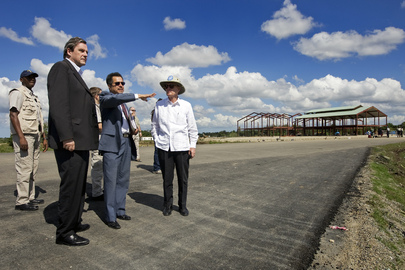
UN's Le Roy and the Lost Horizon
Angelo
said that
soldiers don't deploy because their equipment is not ready. Inner
City Press asked about the case of a French EUFOR soldier shooting an
killing a Togolese peacekeeper serving the UN. Angela acknowledged
the incident -- the only violent killing of a UN peacekeeper
regarding which the UN did not issue a statement, either at the
request of France or because the story was too isolated and strange
-- and said that the shooter from EUFOR was caught two or three days
later and is on trial in France. Will France report the outcome?
New
Horizon will be
the subject of a Security Council debate on August 5. It will not,
the official said, just sit on the shelf, since it is written in
prose reminiscent of Hemingway. He acknowledged, however, that
despite all this planning ahead, the current renovation of the UN
will leave some DPKO staffers twenty minutes away on Madison Avenue.
Inner City
Press suggested they speed to meet with Le Roy on a fleet
of Segways. The official envisioned bicycles instead: send in the
clowns. Back to the
future, Lost Horizons, a laudable mission hamstrung by politics,
excuse making and lack of follow through. We will cover the August 5
debate.
Footnote:
while the UN can unilaterally declare the officials it produces to
answer question to be anonymous, what is seen with the eye is still
for now on the record. On the 27th floor on Tuesday morning was Oscar
Fernandez-Taranco, who only the day before briefing the Security
Council the Middle East, but afterwards did not speak to the Press at
the stakeout, or to a reporter who tried by the elevators. If the UN
has a story to tell...
Also
on the 37th
floor was UN envoy to Somalia Ahmedou Ould Abdallah, who asked Inner
City Press, perhaps as a joke, who had invited it so high. Inner City
Press was told that his presence on the Peacekeeping floor on Tuesday
was only because they have a big conference room, that the briefing
was humanitarian and included John Holmes, who has yet to speak on
Sri Lanka's backtracking on commitments to release its detainees or
its self-exoneration in the murder of 17 aid workers from Action
Contre la Faim.
In an attempt
to get something at least on the
record, Inner City Press at the subsequent noon briefing ask if Ould
Abdallah will have a media availability on July 29 after he briefs
the Council. Video here, from Minute 18:07. He has been in New York
for some days, the official answered -- Inner City Press saw him in
the increasingly empty UN cafeteria on Monday -- and he will be asked
to speak to the Press. We'll be here.
* * *
UN's $8.2 Billion
Peace Budget Faces 2.5% Cut, S. Korea Puts Congo
Drones on Block?
Byline:
Matthew Russell Lee of Inner City Press at the UN: News Analysis
UNITED
NATIONS, June 8 -- Anyone can call for peace, but who will pay for
it? That question was being debate, or at least discussed, in the
basement of the UN past 10 p.m. on Monday night. The UN's Fifth
(Budget) Committee had passed its end of May deadline and still the
$8.2 billion peacekeeeping budget was in dispute.
The U.S, Japan,
European Union and surprise Westerner South Korea are proposing a 2.5
percent across the board reduction in all peacekeeping missions'
budgets. The phrase, taken from the Western Sahara draft of June 6, was
a decision "to reduce the Mission's overall operational costs by a
further 2.5 per cent to be accommodated through efficiency savings."
The Group of 77 and China are resisting.
Take
for example
the UN Mission in the Democratic Republic of the Congo, known by its
French acronym MONUC. The Advisory Committee on Administrative and
Budgetary Questions' "recommendations on the financing of MONUC
would entail an overall reduction of $66,818,200 or some 4.7 percent
of the Mission's overall budget," mostly due to the local
elections MONUC will support being put back into 2010.
The
African Group,
on the other hand, "is concerned that the cuts proposed by the
ACABQ could negatively impact on the effective functioning of the
Mission."
These
quotes are
from public speeches. Consider, however, the confidential
presentation of the Secretariat to ACABQ, the slide script of which
Inner City Press has been given by a well-placed source. The
Secretariat argued that "the budget before you is not a
maintenance budget based on routine operations." Instead the
Secretariat proposed "an increase of $235 million compare to
2008/09... 168 new posts and positions directly related to the surge
in troops."
This
"surge"
is the 3,000 additional personnel called for the Security Council
during the CNDP fighting in the Kivus, before the house arrest and
Nkunda and incorporation
of indicted war criminal Jean-Bosco
Ntanganda into the Congolese Army, where he has worked in connection
with UN-supported operations according to Congolese records. While
troubling, this should at least save money, no? No. The Secretariat
still proposed ever-increased spending.
The
surge will
come, the document says, from "troops from Bangladesh, Egypt and
Jordan... The new Egyptian battalion will be deployed to South Kivu
and the Bangladeshi will be deployed to Ituri... while the Jordan
Special Forces company will be positioned in North Kivu."
Interestingly, the budget includes "$18 million additional
requirements for 2 UAVs" -- unmanned aerial vehicles, the drones
MONUC chief Alan Doss requested at the turn of the year.
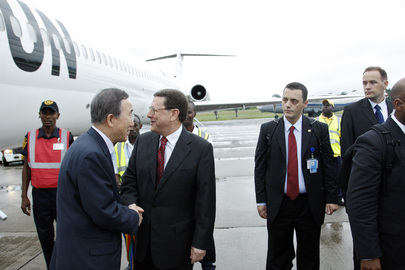
UN's Ban and Doss (not
Mountain) in DRC, budget cuts not shown
Several
Fifth
Committee sources emphasized to Inner City Press the news value of
South Korea's position. Here you have Ban Ki-moon, one source spun,
putting his name on proposals to increase peacekeeping budgets by
almost five percent, while his home country South Korea has joined
the push to instead cut the budgets by 2.5 percent.
The
source asked,
"who's kidding who?" All we could say is "whom."
(On this front it must be said that the Secretariat's presentation to
ACABQ has some laughable typos. It refers for example to "the
Pakistanese battalion." But we digress.)
Upstairs
in the
Delegates' Lounge, a proponent of the Haiti mission's budget told
Inner City Press that MINUSTAH, as it's known, spends 100% or more of
its budget. Mission head Hedi Annabi is called Napoleonic. Other
missions, in their start up phase or even earlier, like Somalia,
might face even steeper cuts.
During
all of this,
the chief of the Department of Peacekeeping Operations Alain Le
Roy
is slated to travel from June 9 to 23 to West Africa. He will stop
first in Nigeria, where 27 peacekeepers have been sentence to jail
for life for protesting not being paid after a UN mission. Another
peacekeeper, female, says she was pressured for sex while on mission.
As a now-dead rapper sang, More money, more problems.
Le
Roy will head
to Cote d'Ivoire, where Laurent Gbagbo keeps putting off the promised
election. When will the mission draw down? The force in Liberia,
too, is called larger than needs be. In the basement, however, it is
a question of whose ox is gored. Watch this site.
* * *
At
UN, Near Final Draft on North Korea Leaked to Inner City
Press, Arms Export Ban and Cargo Inspection Added
Byline:
Matthew Russell Lee of Inner City Press: Exclusive-Must Credit
UNITED
NATIONS, June 5 -- Thirteen days after North Korea conducted an
underground nuclear test, a near-final
draft resolution emerged
behind closed doors at the UN Security Council.
The six-page
draft, a copy of which Inner City Press obtained and puts
online here as a must-credit exclusive, has more than thirty
operative paragraphs, compared to the mere 14 paragraphs of the three-page
draft Inner City Press similarly obtained and published on
May 28. (AP, Japanese and other media appropriately credited Inner
City Press).
This time, Inner City Press is
told by its sources that the draft was circulated to the capitals of
the Permanent Five Plus Two -- these last are Japan and South Korea
-- with the deadline for comments on June 5 at 10 a.m. New York
Time.
The provision allowing North Korea to import light weapons, in
Paragraph 10, is attributable to Russia, according to a well placed
Inner City Press source who calls it the Kalishnikof or AK-47 clause.
Beyond the cargo ban, other provisions are weaker than
the proponents wanted. Paragraph
19, for example, merely calls
on "member states and international
financial and credit institutions not to enter into new
commitments... except for humanitarian and developmental purposes."
Paragraph 17 prohibits "bunkering services, such as provision of
fuel or supplies" to vessels. Paragraph 22 calls for reports
within 45 days.
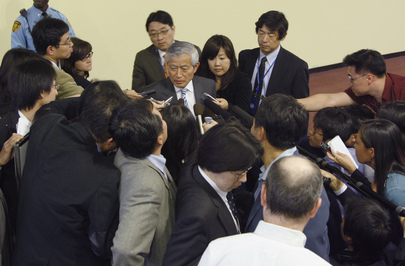
At UN, media chases news of draft now published by Inner City Press
While
the draft resolution seems unlikely to change North Korea's course,
it has been the subject of intense journalistic interest for nearly
two weeks now at the UN in New York, particularly by Japanese media,
who have remained camped out in front of the Security Council during
meetings on Somalia, Bosnia and Tribunals and on June 5, Sudan and
Sri Lanka.
Non-permanent members of the Security Council complained to the Press
that they were kept in the dark throughout the days of negotiation.
On
the morning of June 5, Inner City Press obtained the draft
resolution
that, as a must-credit exclusive, it puts online here. Watch this
site.
* * *
Sri
Lanka Denies IDP Reduction Reported by Inner City Press, Raises to
UN
Byline:
Matthew Russell Lee of Inner City Press at the UN: News Analysis
UNITED
NATIONS, June 5 -- The Sri Lankan government has denounced a story
about "missing" internally displaced people which Inner
City Press, based on discrepancies in UN documents and statements
from UN sources, published this week.
Beyond denying that any IDPs
have been removed from the UN-funded camps in Vavuniya, which Inner
City Press visited on May 23, the government has said
that it is
raising the matter with the UN. "Minister of Human Rights and
Disaster Management, Mahinda Samarasinghe is expected to take up the
issue with United Nations," according to a pro-government web
site.
On
June 2, Ban Ki-moon's Spokesperson publicly denounced Inner City Press
for its reporting, but denied
she had discussed "complaining to Google
News" about it, presumably to stop its distribution or censor it.
The next
day she recanted, click here. Click here
for Inner City Press (on NYTimes.com) on tensions in Sri Lanka.
Inner
City Press' story noted that even the UN, in a May 30 report,
acknowledged that its number of IDPs in the camps decreased by over
13,000.
While the public report by UN OCHA ascribed this sudden drop
-- from May 27 -- to "double counting," local UN sources,
on condition of anonymity due to fear of retaliation not only by the
Sri Lankan government but also by the UN, told Inner City Press that
as with the satellite photos of the conflict zone and casualty
figures, some in the UN were seeking to downplay this potentially
troubling information.
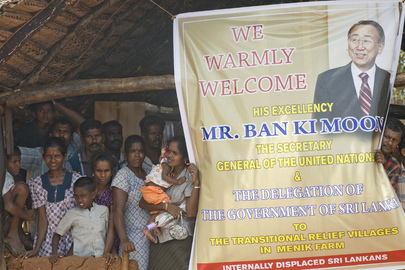
In Vavuniya IDP camp, UN's Ban on government's banner
OCHA's
May 30 report states that "276,785 persons crossed to the
Government controlled areas from the conflict zone. This represents a
decrease of 13,130 IDPs since the last report (Sitrep No.18) on 27
May 2009. The decrease is associated with double counting. Additional
verification is required."
But earlier,
OCHA had praised the "improved, systematic registration
being undertaken in the camps."
The
article
continued that UN
sources in Colombo tell Inner City Press that senior UN officials
above them, Sri Lankan nationals who are Sinhalese, are downplaying
the 13,000 "missing" IDPs, which would otherwise be of much
concern given the reports of disappearances from the camps, the
seizing of teenage males for detention and females for other
purposes, as UK Channel 4 asserted with on camera interviews
Shouldn't the UN look into this more closely, given
multiple and credible reports of people being "disappeared"
from the UN-funded IDP camps? The UN so far has done nothing in this
regard.
To expedite matters, one hopes, Inner City Press now
publishes a list of some of the places where the UN -- or perhaps a
less compromised body -- should look for missing people:
Pallekelle
near Kandy; Ambepussa, Boosa and, it is said, the Army training camp
at Diya-talawwa.
On June 2, Ban Ki-moon's Spokesperson while again publicly denouncing
Inner City Press for its reporting, denied
she had discussed "complaining to Google News" about it, presumably to
stop its distribution or censor it.
The next day, Ms. Montas
confirmed
that both legal action and "complaining to Google News" were
discussed at a meeting she had with four top UN officials,
including
Mr Ban's speech writer, who also traveled to Sri Lanka on May 23, the
UN's top lawyer Patricia O'Brien, Angela Kane and the head of UN
"Public Information," Kiyotaka Akasaka, previously of the
Japanese foreign ministry.
Following a failure by these officials to respond to requests that they
explain how the strategy they discussed comports with the free press
Article 19 of the UN's Universal Declaration of Human Rights, Inner City
Press has asked for action from UN High Commissioner for Human
Rights Navi Pillay, click here.
Footnotes:
During this week's back and forth about the UN threatening legal
action against the Press, and to complain to Google News about Inner
City Press' coverage, a high UN official, again anonymous due to
fear of retaliation even at his level, approached Inner City Press to
say that the attempt at censorship or expulsion was being pushed by
what he diplomatically called "a member state." Asked if
this meant Sri Lanka, he nodded.
Meanwhile,
in a show of retaliation, the UN has taken the step of seizing and
checking the UN e-mail of staff members who they believe have been
sources for Inner City Press. Some say that when the UN went to Sri
Lanka, rather than seek to hold the government to a high standard of
human rights, the effect was to make the UN
(even) more like the
administration of the Rajapaksas...
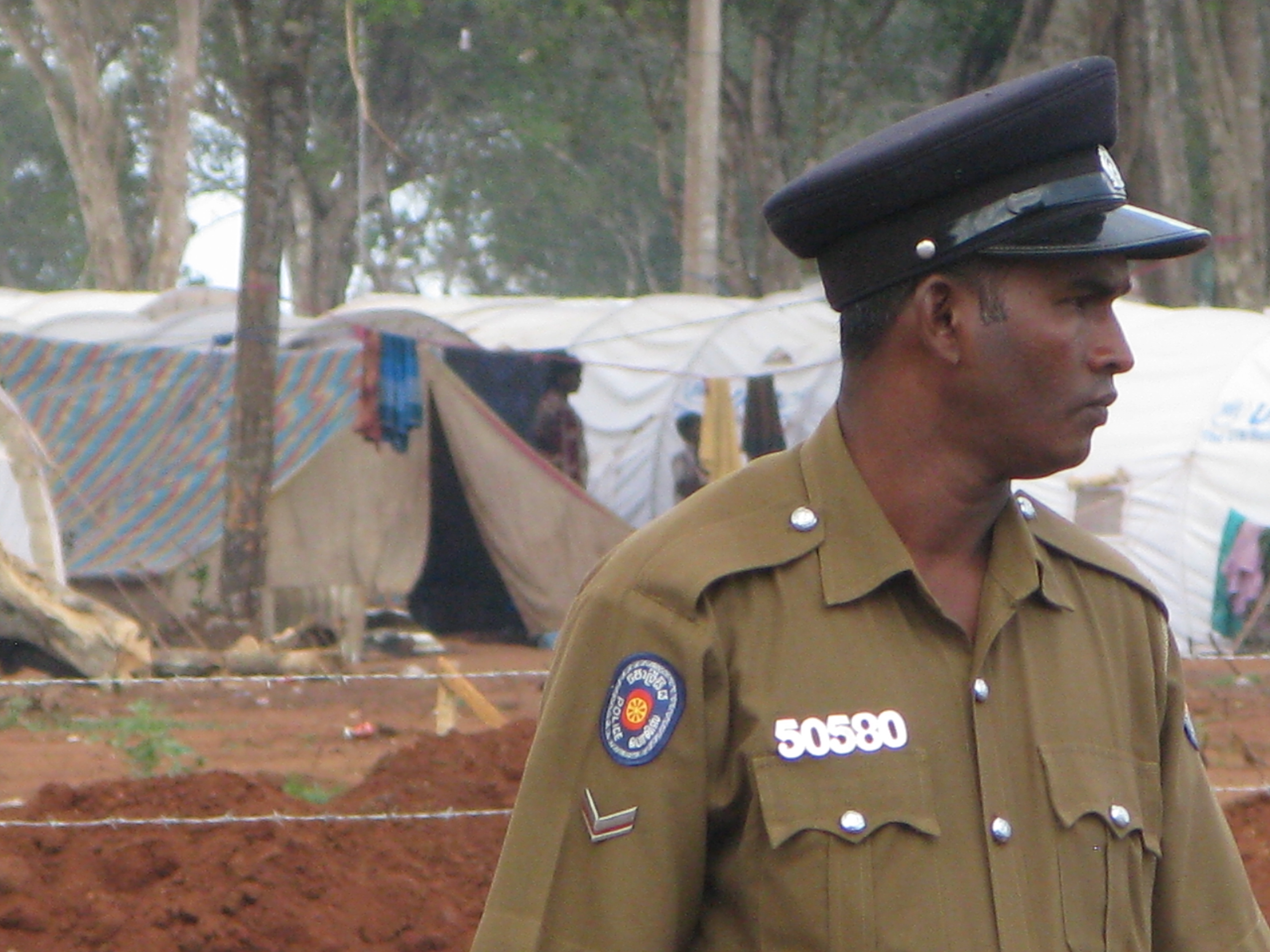
Guard
in Manik Farm camp, (c) M. Lee May 23, 2009
The
article below quoting that "Minister of Human Rights and
Disaster Management, Mahinda Samarasinghe is expected to take up the
issue with United Nations" takes issue with Inner City Press
quoting that
"UN
sources in Colombo tell Inner City Press that senior UN officials
above them, Sri Lankan nationals who are Sinhalese, are downplaying
the 13,000 "missing" IDPs, which would otherwise be of much
concern given the reports of disappearances from the camps, the
seizing of teenage males for detention and females for other
purposes, [as] UK Channel 4 asserted with on camera interviews."
Contrary
to the (intentional?) misinterpretation below, Inner City Press was
not saying that all Sri Lankan nationals are Sinhalese -- rather,
that within the UN's staff in Sri Lanka, those who are of the
majority Sinhalese group are seen by their Tamil colleagues as in
some cases using their positions in the UN to advance, as some phrase
it, "the Sinhalese Buddhist nationalist cause." Inner City
Press did not invent these divisions, and the article's and
minister's statement that all is now well in Sri Lanka is, at best,
wishful thinking. Within the UN, some recall the way in Rwanda a Hutu
staff member named Callixte Mbarushimana was allowed to use his UN
position and materiel to further the Hutu extremist cause which has
since been acknowledged as genocide. The UN continued employing and
paying Callixte Mbarushimana for many years. Some wonder, will that
happen with the UN in Sri Lanka?
On
June 5 outside the UN Security Council, Inner City Press asked the
Special Adviser of the Secretary General on the Prevention of
Genocide, Francis Deng, if his Office will do any work on Sri Lanka.
"We try to follow what is going on, the post-conflict
developments," he said. "It's been going on for twenty five
years, you don't just...." His voice trailed off. "One
phase ended, presumably, but....". And his voice trailed off
again. Of course, it's been "going on" for far longer than
25 years.
The
article:
Sri
Lanka rejects ICP report on IDP disappearance
Fri,
2009-06-05 18:06
By
our Colombo Correspondent
Colombo,
05 June, (Asiantribune.com): The Sri Lankan government today totally
rejected a claim in a Inner City Press (ICP) quoted by a pro LTTE
website, that 13,000 people from Internally Displaced camps have
disappeared, and described it as a malicious attempt to discredit the
Colombo government.
Highly
placed government sources said that the Tamil Diaspora overseas
working for the LTTE were now engaged in a disinformation campaign to
discredit the Government unable to bear the crushing defeat of the
LTTE and its' terrorism.
Rehabilitation
Ministry sources expressed anger and surprise over the pro-LTTE
canard that is being spread through internet websites misquoting
figures of the number of displaced persons.
They
said the ICP report was aimed at creating a rift between communities
now living peacefully as one people of one country." That is why
they have quoted Sinhalese as Sri Lankan nationals knowing well that
Sri Lanka is a multi-ethnic country", they added.
Explaining
further about the contents of the ICP report quoted by a pro-LTTE
website, a ministry source said that if Sri Lanka nationals were only
Sinhalese as claimed, there could be no Tamil displaced persons in
the country.
Meanwhile,
the Minister of Human Rights and Disaster Management,Mahinda
Samarasinghe is expected to take up the issue with United Nations as
the ICP report from the pro-LTTE website had quoted unnamed UN
sources in Colombo to claim such disappearance of a large number of
displaced persons, which, the Sri Lankan government has totally
rejected.
Watch
this site.
Channel
4 in the UK with allegations of rape and
disappearance
Click here
for an Inner City Press YouTube channel video, mostly UN Headquarters
footage, about civilian
deaths
in Sri Lanka.
Click here for Inner City
Press' March 27 UN debate
Click here for Inner City
Press March 12 UN (and AIG
bailout) debate
Click here for Inner City
Press' Feb 26 UN debate
Click
here
for Feb.
12 debate on Sri Lanka http://bloggingheads.tv/diavlogs/17772?in=11:33&out=32:56
Click here for Inner City Press' Jan.
16, 2009 debate about Gaza
Click here for Inner City Press'
review-of-2008 UN Top Ten debate
Click here for Inner
City Press' December 24 debate on UN budget, Niger
Click here from Inner City Press'
December 12 debate on UN double standards
Click here for Inner
City Press' November 25 debate on Somalia, politics
and this October 17 debate, on
Security Council and Obama and the UN.
* * *
These
reports are
usually also available through Google
News and on Lexis-Nexis.
Click here
for a Reuters
AlertNet piece by this correspondent
about Uganda's Lord's Resistance Army. Click
here
for an earlier Reuters AlertNet piece about the Somali
National
Reconciliation Congress, and the UN's $200,000 contribution from an
undefined trust fund. Video
Analysis here
Feedback: Editorial
[at] innercitypress.com
UN
Office: S-453A, UN, NY 10017
USA
Tel: 212-963-1439
Reporter's
mobile (and
weekends):
718-716-3540
Other,
earlier Inner City Press are listed here, and some are available
in the ProQuest service, and now on Lexis-Nexis.
Copyright
2006-08 Inner City Press, Inc. To request
reprint or other permission, e-contact Editorial [at]
innercitypress.com -
|